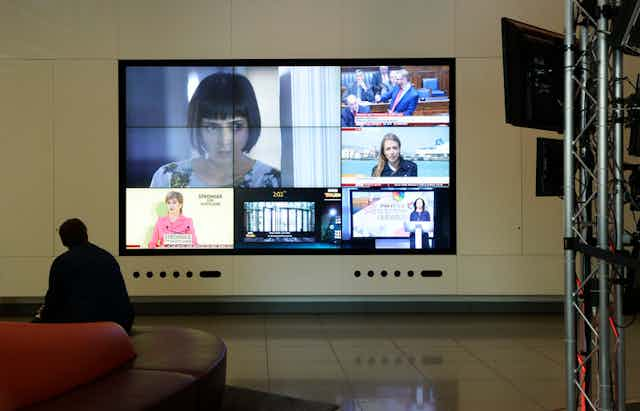Nicky Morgan, the culture secretary, has announced to the Digital, Culture, Media and Sport Select Committee that she is open to replacing the BBC license fee with a Netflix-style subscription charge. This is a significant change from previous ministers who have protected the license fee for many years and ruled out scrapping it.
Back in 2009 an opinion poll in the Daily Telegraph reported that 58% of respondents said the licence fee should be scrapped. Even then it was becoming clear that, in a multi-channel world, demand for the pubic broadcaster was on the decline. Today, streaming has changed the landscape even further.
In an age of time-shifting and box set binge watching, does the BBC license fee still have a place in how we consume television today? Gordon Brown, as chancellor of the exchequer, introduced and funded free licence fees for the over-75s in 1999, but in 2015, the Cameron government reversed this decision – making the BBC responsible for funding licence fees for 1.7m elderly people. In June 2019, the BBC announced it could no longer fund this, saying government funding cuts meant it would otherwise have to close down channels, such as BBC Four or BBC Radio 5 Live.
The licence fee currently generates £3.83 billion for the BBC – about 75% of its total revenue. To move to a subscription model service would require mass engagement and fast. Netflix has just just under 10m subscribers in the UK. paying £72 per annum – so a back-of-the-envelope calculation would estimate its UK revenue at about £700m, which gives you an indication of quite how big a task this could be.
And what does the BBC licence fee buy you these days? If you look at BBC’s daytime schedule for example, a mix of repeats and Bargain Hunter-style programming you have to ask whether this offering represents value for money? The number of peak-time repeats on BBC1 rose by 65% in 2018 according to Ofcom, despite a pledge from the then chairman Michael Grade prime-time that viewing hours on BBC One and BBC Two could be “repeat-free zones” within ten years.
Next to the sheer volume of blue-chip documentaries and dramas on offer from Netflix, is the BBC value for money these days?
‘Treasure’ being buried
The BBC has long been heralded as a “national treasure” and a bastion of excellence in the highest standards and programme making. But its value has been called into question over recent years after regular reporting of a lack of staffing diversity on and off-screen, as well as substantial gender pay gaps and ratings slumps.
The corporation says that the licence fee allows it to run a wide range of popular public service broadcasting for everyone – free of adverts, shareholders and political interests. But it was reported by The Sun newspaper in 2017 that over a four-year period nearly 3.5m Britons had stopped paying the licence fee, as they consider the BBC to be “out of date” in a world of Netflix and Amazon Prime.
According to the BBC’s 2019 Annual Report, the biggest drop has come in audiences aged between 16-34 who watch BBC television TV weekly which has fallen from 60% to 56%. The same age group is also watching for a shorter period of time, down from an average of nearly three hours a week to two hours and 32 minutes. Audiences aged 55 and over are BBC television’s most loyal consumers – with a staggering 92% reach in that age group.
The author of a report on the licence fee from the Institute of Economic Affairs, Philip Booth, believes that the BBC should adopt an opt-in system: “The BBC funding model needs to be pulled into the 21st century,” he wrote. “The UK has a long history of successful mutuals and co-operatives that are popular with their members.”
But adopting a subscription model like that used by Netflix would mean people having to opt in to watch programmes on BBC channels and listen to its radio stations. It’s debatable how the BBC’s ageing audience will react to this sort of model.
Last year’s model
The licence fee model was introduced in 1946 when the world of television was completely different and the BBC had little competition for people’s attention. Now it needs to compete and a remodelled BBC could perhaps better leverage its brand internationally for better commercial success – its back catalogue, for example, must be the envy of many of its competitors. It has been a bumper year for iPlayer with 3.6 billion programme requests, the most popular being Bodyguard. Killing Eve’s first series had 42.5m overall requests.
But is the streaming model under pressure? Netflix an early mover in the high-quality streaming industry, with a formidable business worth in the region of US$125 billion, will soon be competing with Disney+, HBO Max and Apple+ for domination of the television streaming market. Netflix recently wrote to investors to tell them that competition would be a good thing as the bigger the market the more it would be likely to tempt people away from “linear TV”, as Netflix’s describes it.
So the BBC has some big decisions to make. Can it continue to justify the license fee? If it moves to another business model – streaming being most likely in my opinion – the question will be whether it attract enough subscribers quickly enough to compete with the big players. These debates have long raged, but now that the culture minister has signalled that she is open to a change in the public broadcaster’s model, the landscape of British broadcasting may be about to change dramatically.

